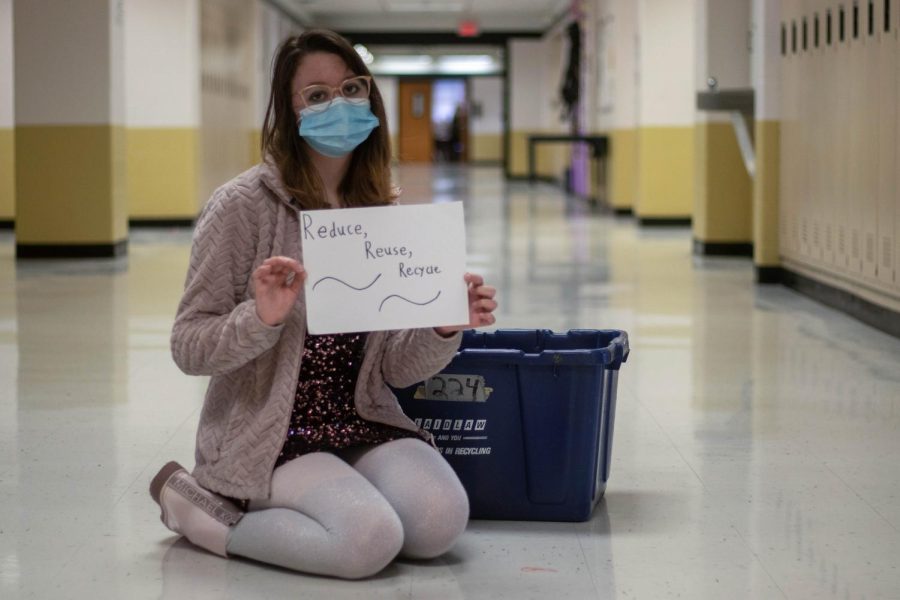Francis Howell North Looks to Become More Environmentally Conscious as New School is Built
Credit to Sadie Cotton
Student supports Norths need to reduce, reuse, recycle to help protect our environment
The school has changed drastically over the last two years. With the new head principal coming to FHN next year, it is important to see how the school is currently impacting the environment to understand some of the many changes the new principal aspires to bring to FHN. Unfortunately for FHN, many of the environmental activities have been severely hindered by COVID-19.
“Some of these things have been quite affected by COVID,” Assistant Principal Jeff Blankenship said. “It just interrupted some of the things that have been done.”
A very important position affected heavily by COVID-19, are the custodians at FHN. Because of how rampant the virus has been, many people are unwilling to work as sanitation workers. This has massively impacted our current custodians by forcing them to balance between keeping the school maintained and limiting the school’s impact on the environment. Administrative Assistant Stephanie Slaughter expresses how difficult it is for the custodians.
“We are very low on custodians,” Slaughter said. “I know some evenings it is difficult for them to get the building cleaned. Adding one more thing to their plate would be very difficult for them.”
There are only five main custodians. With 1,750 students and staff members at FHN, the custodians cannot do everything everyday. However, this is not the only factor currently restricting the school’s ability to help the environment. Head Principal Dr. Lucas Lammers elaborates on how important the new building can be when it comes to conserving energy.
“It’s an old building,” Lammers said. “Old buildings are inefficient when it comes to heat. The new building should be far more efficient when it is built. That’s one of the many reasons we needed a new building, is to have more efficiencies built in.”
The building currently has issues with vents and A/C constantly breaking. With how old the infrastructure is, the efficiency of the ventilation system has deteriorated. This requires the school to use more energy to keep it maintained, skyrocketing our carbon footprint. However, this problem will linger until the new building is completed. Previously, FHN had various clubs that worked to alleviate the school’s carbon footprint. These were clubs like the gardening club and recycling club made specifically for students to help the environment at FHN. These clubs were run by Yvonne Kehoe, an English teacher for the special education department.
“The Gardening Club kind of started an extracurricular activity,” Kehoe said. “We wanted to invite all departments to understand something about the agriculture in the area and participate in any way they could.”
Like the gardening club, the recycling club created a community around the school. Mainly with staff and teachers, blue recycling bags were placed around the building for students to collect and recycle. However, this project was postponed indefinitely.
“It was COVID,” Kehoe said. “Even though the students wore gloves every time they collected the blue bags, I still didn’t want them exposed to whatever germs might be on the recycled materials.”
That being said, if a group of students is willing to continue these clubs or have other ideas to help the environment, they always have the opportunity to create a club.
“People can start a club for any reason,” Blankenship said. “Anytime we have a group of students interested in anything, and they can’t find a sponsor, they go through the activities office and ask for what they need.”
The incoming Head Principal Jeffrey Fletcher believes in allowing students more freedom with the activities they wish to pursue and some of his plans involve the reuse of materials.
“Starting that club back up would be awesome,” Fletcher said. “I think being very conscious of making sure we’re using the materials we’re purchasing or are given to us, and reusing them and not just throwing them away.”
Fletcher is very conscious about making sure the school usage of paper is drastically reduced.
“There’s a lot of technological things that we can do,” Fletcher said. “Something I try to be very conscious about when I’m leading meetings or sending out information to students, parents, and teachers, something I would do personally is sending more of these things out electronically instead of making flyers or posters about it.”
Although the school’s capabilities to stay environmentally conscious were hindered due to COVID-19 and the building’s age, Fletcher hopes to cushion that impact and bring a new environment overall to FHN.
Your donation will support the student journalists of Francis Howell North High School. Your contribution will allow us to purchase equipment and cover our annual website hosting costs.







